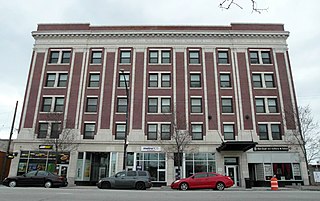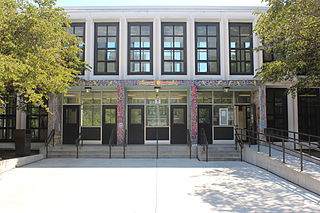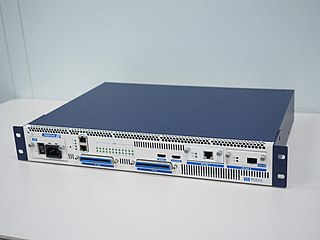Related Research Articles

Hyde Park is the 41st of the 77 community areas of Chicago. It is located on the South Side, near the shore of Lake Michigan 7 miles (11 km) south of the Loop.

A wireless Internet service provider (WISP) is an Internet service provider with a network based on wireless networking. Technology may include commonplace Wi-Fi wireless mesh networking, or proprietary equipment designed to operate over open 900 MHz, 2.4 GHz, 4.9, 5, 24, and 60 GHz bands or licensed frequencies in the UHF band, LMDS, and other bands from 6 GHz to 80 GHz.

Woodlawn, on the South Side of Chicago, Illinois, is one of Chicago's 77 community areas. It is bounded by Lake Michigan to the east, 60th Street to the north, Martin Luther King Drive to the west, and 67th Street to the south. Both Hyde Park Career Academy and the all-boys Catholic Mount Carmel High School are in this neighborhood; much of its eastern portion is occupied by Jackson Park. The Woodlawn section of the park includes the site of the planned Obama Presidential Center, an estimated $500 million investment. The northern edge of Woodlawn contains a portion of the campus of the University of Chicago.

Kenwood, one of Chicago's 77 community areas, is on the shore of Lake Michigan on the South Side of the city. Its boundaries are 43rd Street, 51st Street, Cottage Grove Avenue, and the lake. Kenwood was originally part of Hyde Park Township, which was annexed to the city of Chicago in 1889. Kenwood was once one of Chicago's most affluent neighborhoods, and it still has some of the largest single-family homes in the city. It contains two Chicago Landmark districts, Kenwood and North Kenwood. A large part of the southern half of the community area is in the Hyde Park-Kenwood Historic District. In recent years, Kenwood has received national attention as the home of former U.S. President Barack Obama.

GCI Communication Corp (GCI) is a telecommunications corporation operating in Alaska. Through its own facilities and agreements with other providers, GCI provides cable television service, Internet access, wireline (networking) and cellular telephone service. It is a subsidiary of Colorado-based company Liberty Broadband, a company affiliated with Liberty Media that also owns a 26% interest in Charter Communications, having been originally acquired by Liberty in 2015.

C Spire, formerly known as Cellular South, Inc., is a privately owned technology company headquartered in Ridgeland, Mississippi. The company consists of three business divisions – C Spire Wireless, C Spire Home Fiber, and C Spire Business.

KT Corporation, formerly Korea Telecom, is a South Korean telecommunications company. KT is the second-largest wireless carrier in South Korea, with 16.493 million subscribers as of Q4 2017.

Fiber to the x or fiber in the loop is a generic term for any broadband network architecture using optical fiber to provide all or part of the local loop used for last mile telecommunications. As fiber optic cables are able to carry much more data than copper cables, especially over long distances, copper telephone networks built in the 20th century are being replaced by fiber.

Kenwood Academy is a comprehensive public high school and magnet middle school located in the Hyde Park–Kenwood neighborhood on the south side of Chicago, Illinois, United States. Operated by the Chicago Public Schools (CPS) district, Kenwood opened in 1969. Kenwood limits acceptance of high school students to those living in Hyde Park: from Lake Michigan to Cottage Grove Avenue east to west, and 47th to the Midway Plaisance north to south. Kenwood was recognized as a School of Distinction for its academic achievement and a Model School by the International Center for Leadership in Education in 2004. In addition to being a local high school, Kenwood has a magnet program that accepts students entering into 7th grade who pass a rigorous admissions test. The magnet program accepts students citywide using a random lottery with a standing of 6 or higher in both reading and math.

The Internet in the United States grew out of the ARPANET, a network sponsored by the Advanced Research Projects Agency of the U.S. Department of Defense during the 1960s. The Internet in the United States in turn provided the foundation for the worldwide Internet of today.
Fiber to the premises in the United States are primarily covered by Google Fiber, Verizon, and Lightower.

Lumen Technologies, Inc. is an American telecommunications company headquartered in Monroe, Louisiana, that offers communications, network services, security, cloud solutions, voice, and managed services. The company is a member of the S&P 500 index and the Fortune 500. Its communications services include local and long-distance voice, broadband, Multi-Protocol Label Switching (MPLS), private line, Ethernet, hosting, data integration, video, network, public access, Voice over Internet Protocol (VoIP), information technology, and other ancillary services. Lumen also serves global enterprise customers across North America, Latin America, EMEA, and Asia Pacific.
ACD is a Competitive Local Exchange Carrier and Internet Service Provider, headquartered in Lansing, Michigan. ACD provides Fiber Optic Service, Metro Ethernet, Telephone, Hosted Phone Service, DSL, Datacenter and Web hosting services to all types of customers.
Google Fiber is part of the Access division of Alphabet Inc. It provides fiber-to-the-premises service in the United States, providing broadband Internet and IPTV to a small and slowly increasing number of locations. In mid-2016, Google Fiber had 68,715 television subscribers and was estimated to have about 453,000 broadband customers.

EPB of Chattanooga, formerly known as the Electric Power Board of Chattanooga, is an American electric power distribution and telecommunications company owned by the city of Chattanooga, Tennessee. EPB serves nearly 180,000 homes and businesses in a 600-square mile area in the greater Chattanooga area and Hamilton County. In 2010, EPB was the first company in the United States to offer 1 Gbit/s high-speed internet over a fiber optic network, over 200 times faster than the national average. As a result, Chattanooga has been called "Gig City" and held up as a national model for deploying the world's fastest internet and the most advanced Smart Grid electric distribution system in the United States. On October 15, 2015, Chattanooga implemented the world's first community-wide 10-gig Internet service.
Culture Coast Chicago is a collection of artistically vibrant neighborhoods on the South Side of Chicago, Illinois, United States. Known for its high concentration of museums, music and theater ensembles, performance venues, cultural nonprofits, and arts education opportunities, the region spans from just south of McCormick Place to the South Shore Cultural Center and is bordered by Lake Michigan to the east and the Dan Ryan Expressway to the west.
Gigabit Seattle was a fiber-to-the-home / fiber-to-the-business network planned to be deployed in Seattle, Washington. The network comes out of a partnership between the City of Seattle, the University of Washington and digital economic development company Gigabit Squared to deploy a next generation network in the City. The project is the second city project announced by Gigabit Squared as part of its Gigabit Neighborhood Gateway Program, after Gigabit Chicago.
Gigabit Squared, LLC was a digital economic development corporation that specialized in the planning, implementation and rollout of communications infrastructure. Unlike incumbent telecommunications providers in the United States, who typically own and operate networks in addition to providing wholesale and retail Internet access services, Gigabit Squared designed and built networks, but does not always finance, operate and maintain those networks.

G.fast is a digital subscriber line (DSL) protocol standard for local loops shorter than 500 meters, with performance targets between 100 Mbit/s and 1 Gbit/s, depending on loop length. High speeds are only achieved over very short loops. Although G.fast was initially designed for loops shorter than 250 meters, Sckipio in early 2015 demonstrated G.fast delivering speeds over 100 Mbit/s at nearly 500 meters and the EU announced a research project.

Ziggo Holding B.V. is the largest cable operator in the Netherlands, providing digital cable television, Internet, and telephone service to both residential and commercial customers.
References
- ↑ "City of Chicago issues RFI for gigabit services". Broadband Communities. Retrieved 6 February 2013.
- ↑ McCann, Bailey. "Illinois launches gigabit broadband initiative for Mid-South Chicago neighborhoods". CivSource Online. Retrieved 6 February 2013.
- ↑ Fitchard, Kevin. "Gigabit Squared plans fiber broadband for Chicago's south side". GigaOm. Retrieved 6 February 2013.
- ↑ Pletz, John (16 October 2012). "State, U of C plan broadband push for South Side". Crain's Chicago Business. Retrieved 6 February 2013.
- 1 2 "Gigabit Chicago - Technical FAQs". Gigabit Chicago. Archived from the original on 15 June 2013. Retrieved 6 February 2013.
- ↑ "Gigabit Squared's Gigabit Neighborhood Gateway Program: State's $2 Million Seed Investment Will Jumpstart Fiber Optic and Wireless Network in Mid-South Chicago Neighborhoods; Help Create More Than 50 Jobs". Broadband Illinois. Retrieved 6 February 2013.
- ↑ "Gigabit Squared co-founder and former president resigns amid questions over Seattle deal – Old GigaOm".
- ↑ "Gigabit boondoggle unwinds in Chicago-CICTP". Archived from the original on 2015-09-23. Retrieved 2015-10-17.